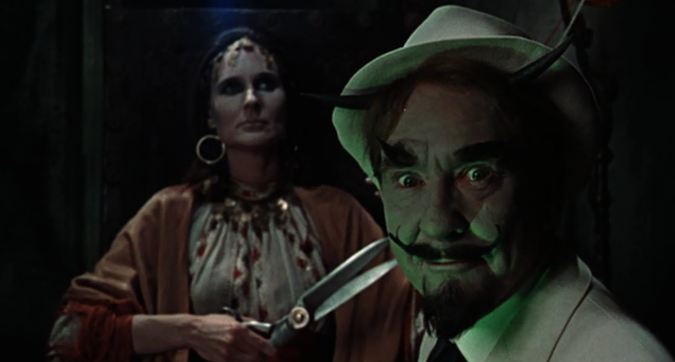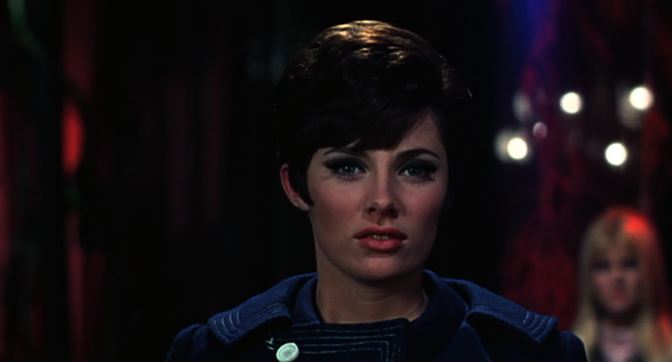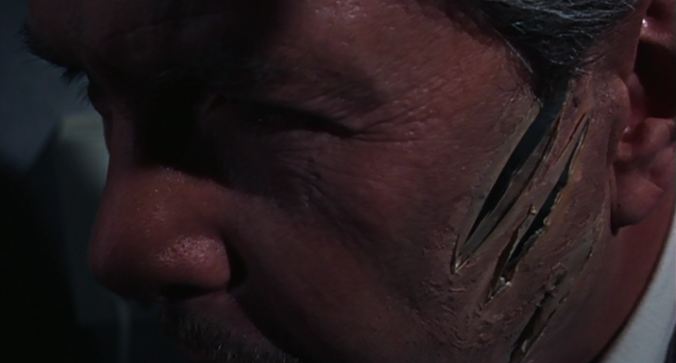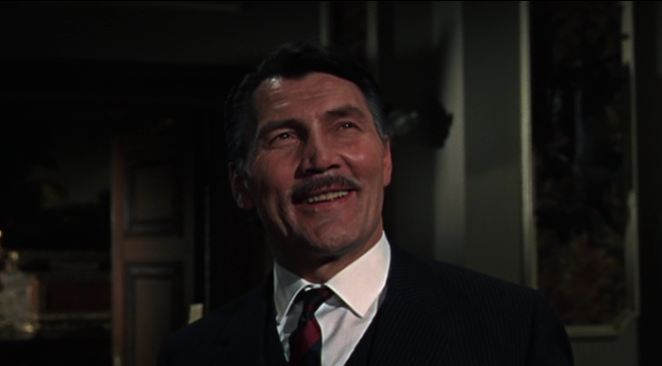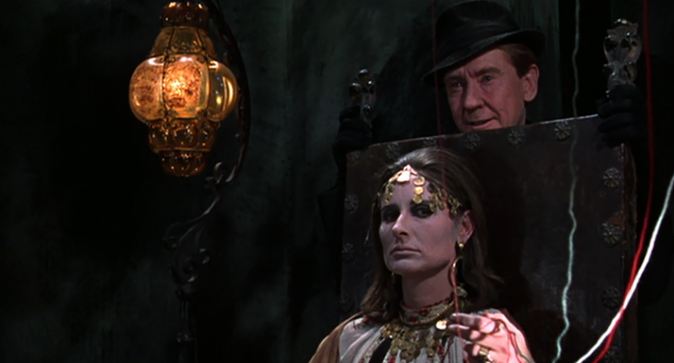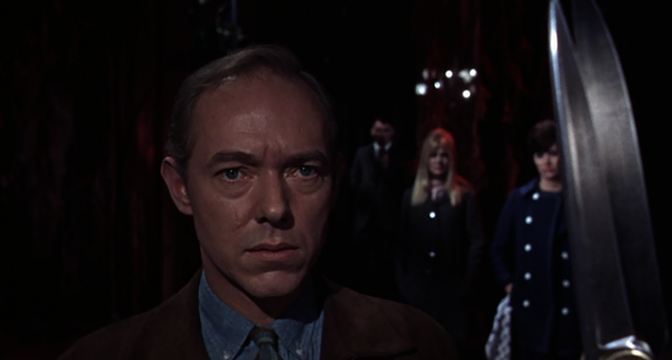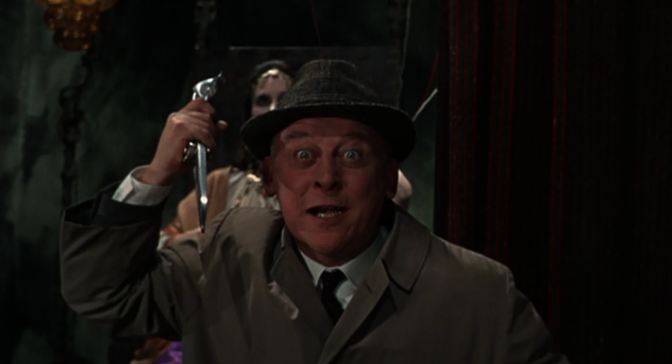Torture Garden (Freddie Francis 1967) starring Burgess Meredith and Jack Palance is the Amicus portmanteau horror film that you’ve seen but forgotten. The cat that uses mental powers to have a man commit murder? The piano that attacks a young woman? The film starlet who will do anything to achieve fame and fortune? Jack Palance as an Edgar Allen Poe enthusiast? There is no torture in this movie (though some viewers disagree!) and ne'ery a garden. Short on surprise and menace, there are however many curiosities to recommend this film, and it yet evokes sympathy by means of its daftness and plodding ups and downs.
I see your face screwing up as you try to remember — so much of it sounds familiar, but don’t these films all blend in to one? Well that they might, and it is no surprise that they should either, for are they not quite forgettable to begin with? You mean you forgot that moving piano that kills people? Credit where it is due, that piano isn't your run of the mill monster . . . although neither is it very effective.
In the case of Torture Garden, I wonder why they don’t stick to more traditionally horrific fare? The killer piano is a killer blow for horror film lows and the ‘the cat made me do it story’, while a faithful exercise in paranoia and greed, is moody and creepy, but not credible, even by the standards of 1967. Horror stories come good or bad at their endings and there are five endings in Torture Garden, so you have multiple chances to find satisfaction. That's one of the perks of portmanteau.
The second short story in Torture Garden, called 'Terror Over Hollywood' (an overstated title) starring Beverly Adams, is probably the best story in terms of the characters, and the technically reasonable way things develop, although it is at heart a very silly tale, and of course no effort is made to suggest that any of it may have been happening in Hollywood. Viewers in general find the first and last stories in Torture Garden to be effective, but I have always had a soft spot for 'Terror Over Hollywood', which features a strange cast of high-powered actors, who mysteriously never age.
Although Jack Palance receives substantial billing in Torture Garden, for 70 minutes or so all we see of him is his standing about, chewing his pipe. When it comes to his crazy little story, called 'The Man Who Collected Poe', a two hander with Peter Cushing, we find him overacting quite terribly, or at least in need of a little guidance or direction. I think too many reviewers confuse acting with the pulling of faces. Palance is a great person to watch, but that doesn’t make his performance any good. Jack Palance may be better to watch than the scenery with his bravado and acting prowess, but most actors can pull off these sort of antics in their sleep, they just choose not to.
Still, cinema history has proved that anything can be sold in the end. This set of stories may have got through for example, because they are from the works of Robert ‘Psycho’ Bloch. Commercial cinema is largely composed of expectation. That’s what made Torture Garden acceptable in its day, because it was built and sold upon expectation. Maybe there is an attempt at genre development, in an attempt to move the stories away from more traditional horror staples, but if that is the case, it’s a mistake. The killer piano isn’t interesting, and 'The Man Who Collected Poe' is not horrific. 'Terror Over Hollywood' is a fair enough story, but there isn’t any terror in it; the most memorable scene is the one in which one girl cheats another out of a date by callously burning her dress with an iron.
It’s odd, but most of Torture Garden is played quite seriously, which is unusual for Amicus. Even the first story in the anthology, with its silly cat nonsense, is played dead straight. In the Amicus films in general however, you usually get the sense that the producers know how silly their fare is. There is a film called The Uncanny, from ten years later, which is about the supernatural properties of cats and although the cat story might fit better in that picture, the episode is still strangely dead-pan, and that is a big ask of any audience, and I suppose a commendable move on the part of the director.
Freddie Francis comes out of this quite well, as it happens, as does Burgess Meredith. Francis enjoys the camera shot with the close up object and the individuals small in the background, and Burgess Meredith takes to the pantomime with ease. Torture Garden is considered to be a superior Amicus portmanteau production, because it has a strong framework story. That is to say, that if you have a film like Tales of Terror (1962) that has no framework, and is merely a collection of three unrelated tales, the purists shrink away.
In Torture Garden, Burgess Meredith holds things together, as Peter Cushing did in Dr Terror’s House of Horrors (1964) by being the demonic controller of proceedings. As in Dr Terror, and The Vault of Horror, corrupt individuals are exposed to the horrific consequences of their passions and actions. You gain something and you lose something, but in the end it just boils down to cinematic time-killing. In Torture Garden, Burgess Meredith incidentally reprises his extra-long cigarette holder, which he carried as the Penguin, whom he played in the Batman television series.
Michael Ripper - never a let down
Torture Garden was released in 1967, in double bill with Berserk. Purists and collectors, both of whom have been mentioned, will be pleased to see Michael Ripper in Torture Garden, although the poor man seemed to have been perpetually and horrifically fated to play minor roles — his Hammer staple being the innkeeper.
In the meantime, here’s a quick checklist of your Amicus portmanteau classics:
Dr Terror’s House of Horrors (1964)
Torture Garden (1967)
The House that Dripped Blood (1970)
Asylum (1972)
Tales from the Crypt (1972)
The Vault of Horror (1973)
From Beyond the Grave (1973)
and for completists, there is the unofficial Amicus film, The Monster Club (1980)
Amicus did make some winners in that innocent and golden era, such as Dr. Who and the Daleks (1965), Daleks' Invasion Earth 2150 A.D. (1966), I, Monster (1971), and The Land That Time Forgot (1975). But these are just four from many, and of course they have a limited appeal in their own rights.
Now please, let's watch the trailer for Torture Garden, torture enough in itself my friends, without having to brave the full 100 minutes of the finished effort.

